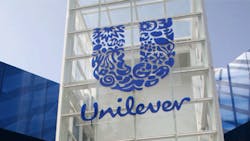Unilever Announces Sweeping Supply Chain Measures to Fight Climate Change
Unilever announced on June 15 its commitment to “improve the health of the planet by taking even more decisive action to fight climate change, and protect and regenerate nature, to preserve resources for future generations.“
The company is aiming to achieve net-zero emissions from all of its products by 2039. This includes the entire product lifecycle beginning with how it sources its materials, up to the point of sale of products in the store.
“While the world is dealing with the devastating effects of the Covid-19 pandemic, and grappling with serious issues of inequality, we can’t let ourselves forget that the climate crisis is still a threat to all of us,” said Alan Jope, Unilever CEO, in a statement.
“Climate change, nature degradation, biodiversity decline, water scarcity – all these issues are interconnected, and we must address them all simultaneously," Jope added. "In doing so, we must also recognize that the climate crisis is not only an environmental emergency; it also has a terrible impact on lives and livelihoods. We, therefore, have a responsibility to help tackle the crisis: as a business, and through direct action by our brands.”
To address these issues the company created a new Climate and Nature Fund. The fund will receive €1 billion to be used over the next ten years for programs including landscape restoration, reforestation, carbon sequestration, wildlife protection and water preservation.
“Our collective responsibility in tackling the climate crisis is to drive an absolute reduction of greenhouse gas emissions, not simply focus on offsetting – and we have the scale and determination to make it happen,” said. Marc Engel, Unilever Chief Supply Chain Officer. “But this is not enough. If we want to have a healthy planet long into the future, we must also look after nature: forests, soil biodiversity and water ecosystems.
“In most parts of the world, the economic and social inclusion of farmers and smallholders in sustainable agricultural production is the single most important driver of change for halting deforestation, restoring forests and helping regenerate nature. In the end, they are the stewards of the land. We must, therefore, empower and work with a new generation of farmers and smallholders in order to make a step change in regenerating nature.”
In order to increase the overall health of the planet, the company will work with farmers to implement programs that protect and restore forests, soil and biodiversity. And it will work with governments and other organizations to improve access to water for communities in water-stressed areas.
The new initiatives will build on the work that is already underway, such as Ben & Jerry’s initiative to reduce GHG emissions from dairy farms; Seventh Generation advocating for clean energy for all; and Knorr supporting farmers to grow food more sustainably.
Supply Chain Initiatives
Unilever explained that its existing science-based targets are to have no carbon emissions from its own operations and to halve the GHG footprint of its products across the value chain, by 2030. To achieve this goal eleven years ahead of the 2050 Paris Agreement deadline, the company said it will prioritize building partnerships with suppliers who have set and committed to their own science-based targets. The company will set up a system for its suppliers to declare, on each invoice, the carbon footprint of the goods and services provided.
Unilever is also introducing a Regenerative Agriculture Code for its suppliers. The new code will build on the company's existing Sustainable Agriculture Code and it will include details on farming practices that help rebuild critical resources. The Regenerative Agriculture Code will be available to any organization that may find it useful – with the goal of driving change throughout the industry.
Unilever will also step up direct efforts to preserve water. Already, 40% of the world's population is affected by water scarcity, and more than 2.1 billion people consume unsafe drinking water. The company will implement water stewardship programs for local communities in 100 locations by 2030. To do this, Unilever will build upon its Prabhat program in India, which tackles water quality and supply risks around our factories. This program takes a community approach to water management, and not only helps farmers across cropping seasons but also addresses the basic human need for adequate and easy access to water.
Unilever will also join the 2030 Water Resources Group, a multi-stakeholder platform hosted by the World Bank, to contribute to transformative change and building resilience in water management in key water-stressed markets, such as India, Brazil, South Africa, Vietnam and Indonesia. To further protect water resources, the company aims to make its product formulations biodegradable by 2030, to minimize its impact on water and the aquatic ecosystems.
About the Author
IW Staff
Find contact information for the IndustryWeek staff: Contact IndustryWeek
